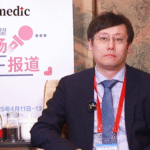
In a landmark advancement in xenotransplantation, the team at Xijing Hospital of the Air Force Medical University has achieved a major scientific milestone. Under the guidance of Academician Kefeng Dou from the Chinese Academy of Sciences, a multidisciplinary team led by Professor Weijun Qin, Chief of Urology, successfully completed the world’s fifth genetically modified pig kidney transplant. This achievement marks China’s emergence as a global leader in xenotransplantation technology.
Confronted with the challenge of key immunosuppressive drugs being unavailable in China, the team drew on over a decade of research to develop an innovative, China-specific immunotherapy protocol. The patient, 37 days post-operation, remains in stable condition—demonstrating both the safety and efficacy of this homegrown solution.
At the 5th CUDA Yanqi Lake Meeting, organized by the Chinese Urological Doctor Association, UroStream invited Professor Weijun Qin to share the key insights behind this landmark success and its significance for the future of transplant medicine.
UroStream: Recently, you and your team achieved another major milestone in the field of xenotransplantation. What is the international significance of this procedure? Compared with the previous four cases worldwide, what distinguishes China’s technical approach?
Professor Weijun Qin: In March, under the leadership and guidance of Academician Kefeng Dou, we carried out Asia’s first and the world’s fifth genetically modified pig kidney transplant in a patient with end-stage renal disease. Academician Dou has spent over a decade advancing the field of organ transplantation, laying a strong foundation for our hospital’s capabilities. More than 20 departments across the hospital worked closely together to ensure the successful completion of the procedure. As of now, 37 days post-operation, the patient remains in stable condition, and both the surgery and perioperative management have been successful.
When it comes to post-transplant immunosuppressive management, our approach differs from that of other countries. For example, CD40/CD154 antibody drugs commonly used abroad are not yet approved in China. Based on years of experience in animal studies and preclinical research, we developed an immunosuppressive regimen tailored specifically for the Chinese clinical environment. Current results confirm that this China-originated protocol is both feasible and effective, and we hope it will continue to evolve into a distinct technological advantage in future applications.
UroStream: This surgery required the collaboration of over 20 departments, including urology, hepatobiliary surgery, anesthesiology, intensive care, nephrology, and more. How was the multidisciplinary team (MDT) model implemented across preoperative evaluation, intraoperative procedures, and postoperative care? How did you ensure seamless coordination at each stage?
Professor Weijun Qin: That’s an excellent and very important question. In this case, the patient had an extensive medical history—30 years of diabetes and hypertension, a stroke and myocardial infarction three years ago requiring stent placement, hemiplegia resulting from the stroke, a subsequent hip fracture from a fall, and diabetic foot. The overall health status was extremely poor. For a patient like this, even routine surgeries would pose serious risks, let alone an organ transplant, which significantly elevates the stakes for perioperative management.
Organ transplantation is not just about the surgical procedure—it also involves managing immune rejection, coagulation, and infection risk, all of which require a highly coordinated effort across departments. No single specialty can handle these complexities alone. Fortunately, as a military hospital, we have a tradition of strong cohesion and teamwork.
Under Academician Dou’s leadership, our team has maintained an exceptional spirit of collaboration for many years. For this particular patient, a comprehensive care plan was formulated under his direction in partnership with the urology department. Every other department involved provided full support, with 24-hour coverage to ensure the stability and success of the entire perioperative process.
UroStream: Xenotransplantation holds promise not only for kidney disease patients but also for those in need of liver or heart transplants. What is the current status of research in these other organ types? What are the main technical challenges?
Professor Weijun Qin: In clinical research, early exploration in xenotransplantation actually began with heart transplantation. The U.S. has conducted two such clinical cases, but both encountered significant post-operative complications. As a result, heart xenotransplantation remains in an exploratory phase. In comparison, kidney transplantation has a more straightforward functional mechanism, making it the more actively pursued area in current xenotransplantation research. Globally, five pig-to-human kidney transplants have been performed—four in the United States and the fifth by our team in China.
In the area of liver transplantation, the United States has not yet launched preclinical or clinical studies. However, our hospital’s liver surgery team, led by Academician Kefeng Dou, has already initiated preclinical xenotransplantation research in this domain—making us one of the first internationally to do so. The liver is a highly complex organ, responsible for protein synthesis, metabolism, detoxification, and coagulation regulation, so xenotransplantation involving the liver presents a significantly higher level of technical difficulty.
The work of Academician Dou’s team demonstrates that China is now at the forefront of global research in liver xenotransplantation. At present, preclinical studies for xenogeneic heart transplants have yet to be launched in China, while in kidney transplantation, we have closely followed global developments and made significant breakthroughs—culminating in the successful completion of the world’s fifth xenogeneic kidney transplant.
Looking ahead, under the leadership of Academician Dou, we aim to continue advancing xenotransplantation technology and anticipate initiating the sixth clinical case when the time is right. Our goal is to contribute innovative Chinese solutions to help address the global shortage of transplantable organs.
Professor Weijun Qin
Chief, Department of Urology Surgery, Xijing Hospital, Air Force Medical University Chief Physician | Professor | Doctoral Supervisor
- Visiting Scholar, Mayo Clinic, Northwestern University, USA
- Deputy Chair, Urology Division, Chinese Medical Doctor Association
- Member, Urology Branch, Chinese Medical Association
- Deputy Chair, Urologic Oncology Committee, Chinese Anti-Cancer Association
- Standing Committee Member, National Urology Professional Committee
- Editorial Board Member of multiple journals including: Modern Urology Journal Chinese Journal of Surgery Chinese Journal of Urology Journal of Clinical Oncology (Chinese Edition, Urologic Oncology Section)


